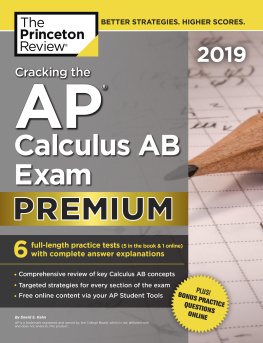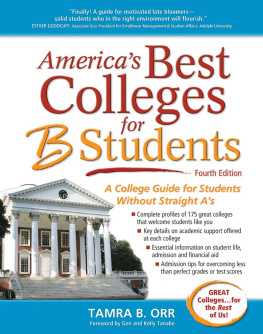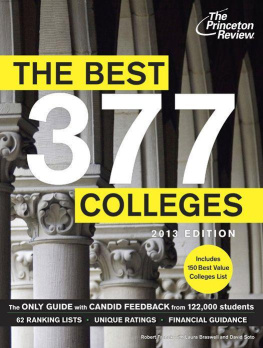Review - Colleges That Create Futures
Here you can read online Review - Colleges That Create Futures full text of the book (entire story) in english for free. Download pdf and epub, get meaning, cover and reviews about this ebook. year: 2017, publisher: Random House Childrens Books, genre: Home and family. Description of the work, (preface) as well as reviews are available. Best literature library LitArk.com created for fans of good reading and offers a wide selection of genres:
Romance novel
Science fiction
Adventure
Detective
Science
History
Home and family
Prose
Art
Politics
Computer
Non-fiction
Religion
Business
Children
Humor
Choose a favorite category and find really read worthwhile books. Enjoy immersion in the world of imagination, feel the emotions of the characters or learn something new for yourself, make an fascinating discovery.

- Book:Colleges That Create Futures
- Author:
- Publisher:Random House Childrens Books
- Genre:
- Year:2017
- Rating:4 / 5
- Favourites:Add to favourites
- Your mark:
- 80
- 1
- 2
- 3
- 4
- 5
Colleges That Create Futures: summary, description and annotation
We offer to read an annotation, description, summary or preface (depends on what the author of the book "Colleges That Create Futures" wrote himself). If you haven't found the necessary information about the book — write in the comments, we will try to find it.
Review: author's other books
Who wrote Colleges That Create Futures? Find out the surname, the name of the author of the book and a list of all author's works by series.
Colleges That Create Futures — read online for free the complete book (whole text) full work
Below is the text of the book, divided by pages. System saving the place of the last page read, allows you to conveniently read the book "Colleges That Create Futures" online for free, without having to search again every time where you left off. Put a bookmark, and you can go to the page where you finished reading at any time.
Font size:
Interval:
Bookmark:
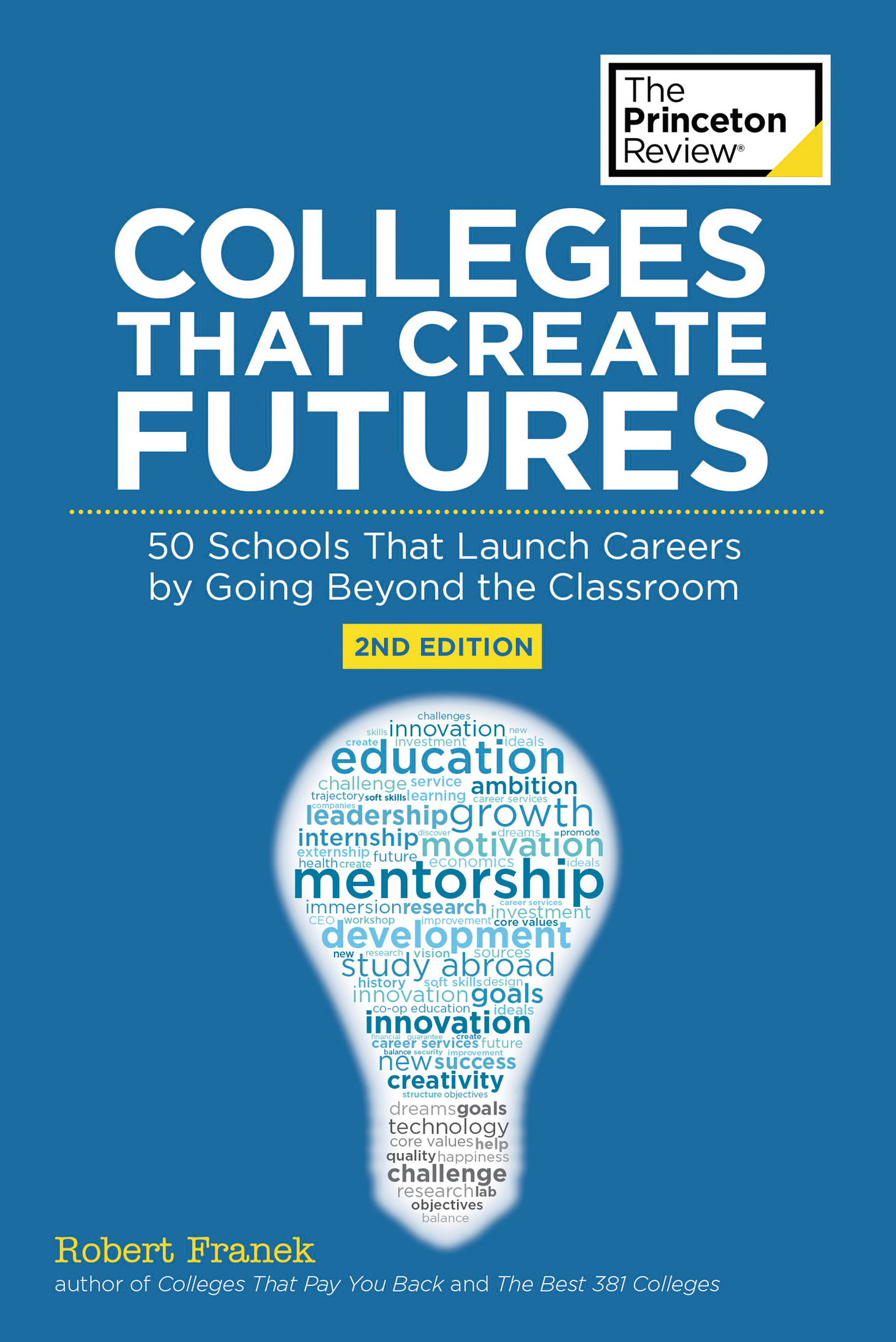
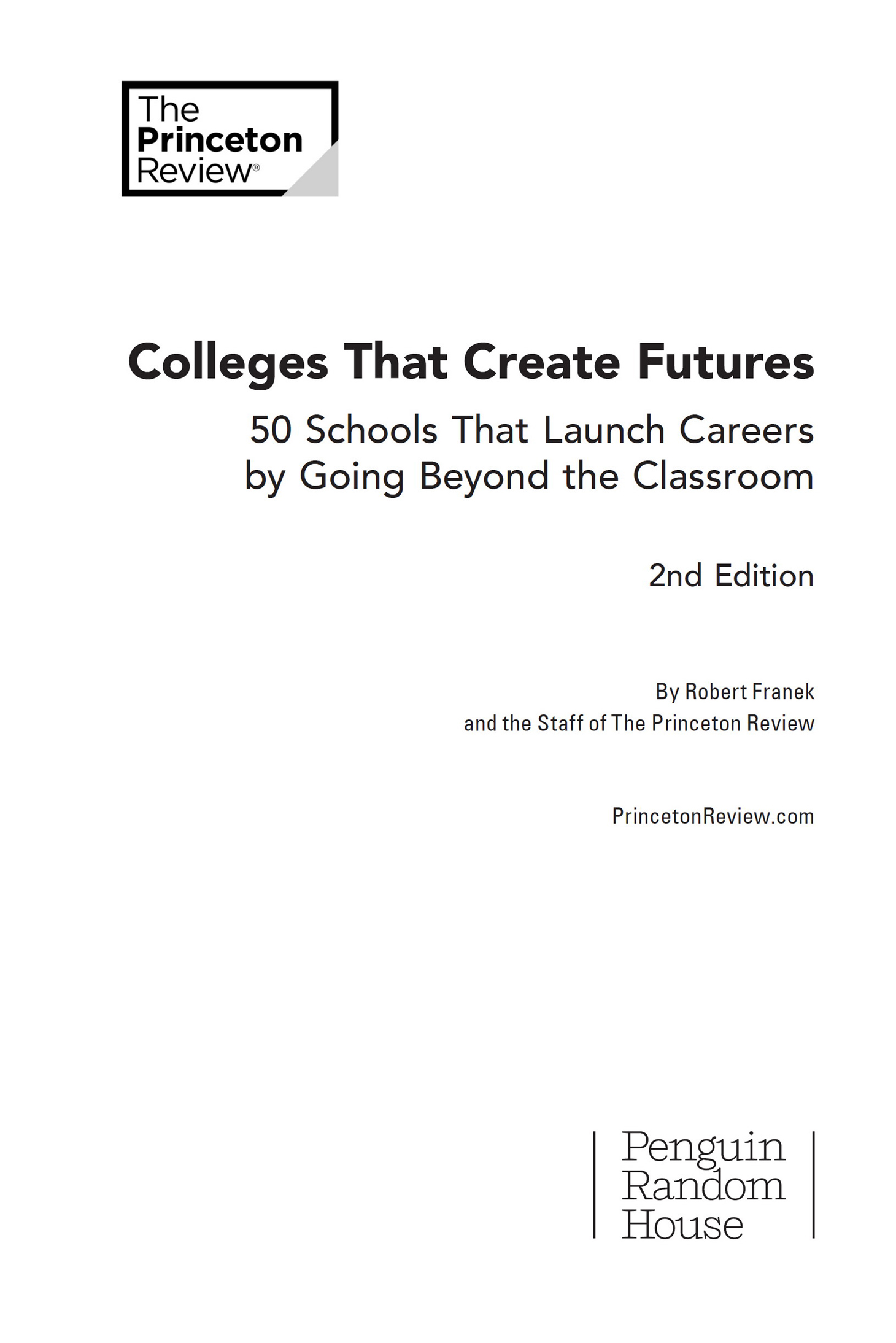
Editorial
Robert Franek, Editor-in-Chief
David Soto, Director of Content Development
Kristen OToole, Editorial Director
Steven Koch, Student Survey Manager
Pia Aliperti, Editor
Penguin Random House Publishing Team
Tom Russell, VP, Publisher
Alison Stoltzfus, Publishing Director
Ellen L. Reed, Production Manager
Jake Eldred, Associate Managing Editor
Suzanne Lee, Designer
The Princeton Review
555 W. 18th Street
New York, NY 10011
2017 by TPR Education IP Holdings, LLC. All rights reserved.
Published in the United States by Penguin Random House LLC, New York, and in Canada by Random House of Canada, a division of Penguin Random House Ltd., Toronto.
All rankings, ratings, and listings are intellectual property of The Princeton Review. No rankings, ratings, listings, or other proprietary information in this book may be repurposed, abridged, excerpted, combined with other data, or altered for reproduction in any way without express permission of The Princeton Review.
Trade Paperback ISBN9780451487834
Ebook ISBN9781524710309
Production: Best Content Solutions, LLC
Production Editor: Melissa Duclos
The Princeton Review is not affiliated with Princeton University.
v4.1
a
This book would not have been possible without the following individuals here at The Princeton Review and beyond, who contributed to making Colleges That Create Futures a reality: Pia Aliperti and Kristen OToole, who were instrumental in the development of this title; and Scott Harris of Best Content Solutions and production editor Melissa Duclos, who transformed the various pieces of the manuscript into the book now in your hands.
A special thank you goes to writers Jason Bailey, Alex Dryden, Melissa Duclos, Sasha Fletcher, Jordan Foster, Laura Goode, Lincoln Michel, Katrina Otuonye, and Lucie Parker for their dedication in poring through surveys and interviews to produce the narratives of each school profiled. Thank you to our Student Survey Manager, Stephen Koch, who continues to work in partnership with school administrators and students alike. My continued thanks go to our data collections master, David Soto for his successful efforts in collecting and accurately representing the statistical data that we draw upon to create these college profiles.
Quite a few administrators, professors, and college alumni/ae kindly set aside time to speak with us about the experience at their institutions. We thank them for taking the time out of their busy lives to answer questions about the most meaningful experiences on their campuses. We commend you for your generosity in guiding the next generation of college applicants to find that best fit college that will transform them.
Robert Franek
Editor-in-Chief
Author, Colleges That Pay You Back and The Best 381 Colleges
Rest assured: every one of the fifty colleges in this guide offers a terrific education. But when it comes to getting the most out of college, the experiences you have outside the classroom are just as important as what you study. Every year, via our College Hopes & Worries survey (www.princetonreview.com/college-hopes-worries), one of the questions we ask college applicants and their parents is What do you consider the biggest benefit of going to college will be? Since 2010, when we first added the question to our survey, the plurality of respondents have seen the main benefit of a college degree as a potentially better job and higher income while the rest saw the education or exposure to new ideas as the major benefit. We see this point of view reflected on college campuses as well. At many schools, career services advisers begin to engage with students earlier in their time on campus, often in the first few weeks of their first year. These trends in career services arent a result of colleges pressuring students to plan out their futures before they are readyrather, colleges and universities are working to help students identify their interests, strengths, and passions, and use those to build the foundation of a meaningful career strategy.
Schools that empower students help them to discover practical applications for their talents and interests, oftentimes through experiences that complement or build upon their classes and coursework. Hands-on activities like internships, studying abroad, assisting with faculty research, and other experiential learning options give students the opportunities to apply their knowledge to authentic, real-world situations. Employers think so, too. According to the National Association of Colleges and Employers, 78 percent of employers feel that the ability to work in a team is a critical soft skill theyd most want to see in recent college grads. (Other top skills include: problem-solving skills, written proficiency, strong work ethic, and verbal communication.)
You can think of experiential learning as learning by doing, but thats just half of it. Experiential learning is also applying what you already know (such as concepts and theories) to unfamiliar and variable situations. In some ways its like the difference between learning Spanish vocabulary words in a classroom and trying to order local cuisine off a menu in Barcelona. Interacting with real Spanish speakers, who might talk faster than youre used to and pepper their conversation with slang and idioms, is a more authentic experience than learning Spanish solely in an American classroom.
Experiential learning is also a great way to find out what you like and what you dont. You love your biology and chemistry classes, but do you really want to go to medical school? An externship program shadowing a doctor for the day may convince you to sign up for the MCAT. Are your sensibilities better suited for an institutional software company or a scrappy environmental startup? Summer internships in both the corporate and non-profit worlds can give you a better idea of what fits you best. These types of activities are chances to discover new interests and to develop talents and strengths, even in areas beyond your majorand more crucially, beyond your comfort zone. Theres also a risk factor involved. The Association of Experiential Education explains that as experiential learning experiences require students to take initiative, make decisions and be accountable for results, students may also experience success, failure, adventure, risk-taking and uncertainty. Just like in the real world, you cant totally predict what the outcome of an experience will bebut no matter what youll learn from it.
The final component of an experiential learning experience is reflection. What specifically did you learn through the experience? How could you apply what youve learned to other settings? Landing a great job after college means articulating your strengths and demonstrating their value to a potential employer. For example, upon reflection it will become clear that your work-study gig as a peer tutor in the Writing Center strengthened your ability to break down complex material for others to understandan experience you can reference when an employer is looking for someone with impeccable communication skills. Similarly, your role on the Solar Car Team on campus finessed your technical skills as well as the ability to problem-solve as part of a team.
Font size:
Interval:
Bookmark:
Similar books «Colleges That Create Futures»
Look at similar books to Colleges That Create Futures. We have selected literature similar in name and meaning in the hope of providing readers with more options to find new, interesting, not yet read works.
Discussion, reviews of the book Colleges That Create Futures and just readers' own opinions. Leave your comments, write what you think about the work, its meaning or the main characters. Specify what exactly you liked and what you didn't like, and why you think so.


